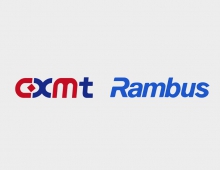
Rambus Claims Power Efficiency Breakthrough for Mobile Memory Solutions
Memory technology licensing companiy Rambus today announced it has achieved a new breakthrough level of power efficiency with its latest silicon test vehicle developed through its Mobile Memory Initiative (MMI).
The latest silicon-validated results demonstrate that through the use of MMI innovations, a high-bandwidth mobile memory controller can achieve a world-leading power efficiency of 2.2mW/Gbps. This is nearly a one third improvement over the initial MMI silicon and significantly better than the estimated 10mW/Gbps of an LPDDR2 400 memory controller.
Launched in February 2009, Rambus MMI focuses on achieving high bandwidth at very low power to enable advanced applications in next-generation smartphones, netbooks, portable gaming and portable media products. Operating at 4.3Gbps, a memory system using MMI innovations can deliver over 17GB/s of memory bandwidth from a single mobile DRAM device.
"The performance demands of next-generation mobile devices are vastly outstripping the pace of battery technology improvements," said Martin Scott, senior vice president of Research and Technology Development at Rambus. "With the innovations developed through our Mobile Memory Initiative, we can deliver advanced applications and maintain long battery life through our breakthroughs in both bandwidth performance and power efficiency."
Rambus MMI encompasses key innovations based on its signaling and memory architecture expertise, including Very Low-Swing Differential Signaling, FlexClocking Architecture, and Advanced Power State Management. In addition, Rambus FlexPhase and Microthreading technologies improve the power efficiencies of mobile platforms.
The company will discuss its approach to solving mobile memory challenges during a presentation by Judy Chen at the ARM TechCon3 on October 22, 4:00 - 4:45 p.m. PT at the Santa Clara Convention Center. This presentation, entitled "Is Mobile Memory Becoming the New Power Hog?" will cover trends driving performance and power consumption in the handset platform and outline how Rambus MMI innovations can improve power consumption.
Launched in February 2009, Rambus MMI focuses on achieving high bandwidth at very low power to enable advanced applications in next-generation smartphones, netbooks, portable gaming and portable media products. Operating at 4.3Gbps, a memory system using MMI innovations can deliver over 17GB/s of memory bandwidth from a single mobile DRAM device.
"The performance demands of next-generation mobile devices are vastly outstripping the pace of battery technology improvements," said Martin Scott, senior vice president of Research and Technology Development at Rambus. "With the innovations developed through our Mobile Memory Initiative, we can deliver advanced applications and maintain long battery life through our breakthroughs in both bandwidth performance and power efficiency."
Rambus MMI encompasses key innovations based on its signaling and memory architecture expertise, including Very Low-Swing Differential Signaling, FlexClocking Architecture, and Advanced Power State Management. In addition, Rambus FlexPhase and Microthreading technologies improve the power efficiencies of mobile platforms.
The company will discuss its approach to solving mobile memory challenges during a presentation by Judy Chen at the ARM TechCon3 on October 22, 4:00 - 4:45 p.m. PT at the Santa Clara Convention Center. This presentation, entitled "Is Mobile Memory Becoming the New Power Hog?" will cover trends driving performance and power consumption in the handset platform and outline how Rambus MMI innovations can improve power consumption.




















